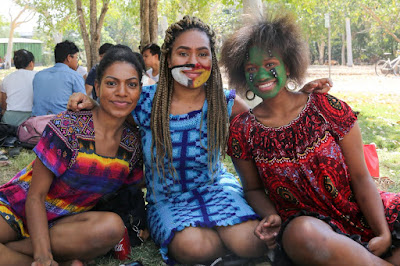Lost in Translation: Papua New Guinea Wins The Language Olympics
If you're travelling to Papua New Guinea, you do not have to
pack a phrasebook, you would like to bring a whole library. With 841 living
tongues and a vibrant creole interlanguage, this Pacific nation is that the
undisputed world champion of linguistic diversity.
From Pii within the mist-cloaked highlands to Toaripi on the
shores of the gleaming Coral Sea, Papua New Guinea may be a linguist's paradise
with one in 10 of the world's languages found here.
The number of speakers of individual languages can range
from a couple of individuals within the jungle -- not far more than a relatives
-- to millions spread across provinces and terrains.
Experts point to the country's relatively weak central
government, deep valleys, almost impenetrable vegetation and roughly 600
islands to elucidate why a rustic of eight million people and smaller than
Spain has such a bounty of languages, when 46 million Spaniards -- for all
practical purposes -- cope with a dozen approximately .
Many of those diverse tongues have developed undisturbed
over tens of thousands of years, making Papua New Guinea something of a
linguistic Galapagos.
To get by day-to-day, Papua New Guineans typically speak
three to 5 languages, and understand more dialects.
But ironically they will sometimes struggle to render an
easy sentence in one language into their maternal language -- particularly when
discussing numbers over 10 or when rural-based languages are deployed to
explain life within the big city.
When asked to mention "there are quite 800 languages in
Papua New Guinea" in Vula'a -- which features a few thousand speakers
within the central province -- Port Moresby office worker Sonia Pegi has got to
call her dad just to form sure she has it right.
Pidgin English
The country's most generally speech is pidgin English or Tok
Pisin, although this being Papua New Guinea , Tok Pisin only claimed its
interlanguage status after beating out a pretender within the sort of
semi-creole Austronesian Hiri Motu.
Tok Pisin, Hiri Motu and English are the country's three
official languages.
"Tok Pisin springs 80-85 percent from English,"
said Jenny Homerang who is starting a pidgin language course at the Australian
National University in Canberra. "But you furthermore may have bits of
German and bits of Portuguese."
In fact, Tok Pisin are some things of a linguistic sponge,
absorbing words from languages as distant as Taiwanese and Zulu, which
dominates the southeastern corner of Africa.
Suspected sorcerers -- who in Papua New Guinea can often be
the victims of utmost violence -- are mentioned as "sangoma", a word
familiar to anyone living in Johannesburg or Durban.
Tok Pisin is additionally a deeply expressive language:
you'll 'bagarap' your car in an accident, or relieve yourself within the
'sithaus'.
But sometimes things stray in translation. 'Ol' means
'they', not 'all', which may confuse a first-time visitor.
Similarly, 'lukim yu bihan' isn't an instruction to show
around, but how of claiming 'goodbye'.


Post a Comment